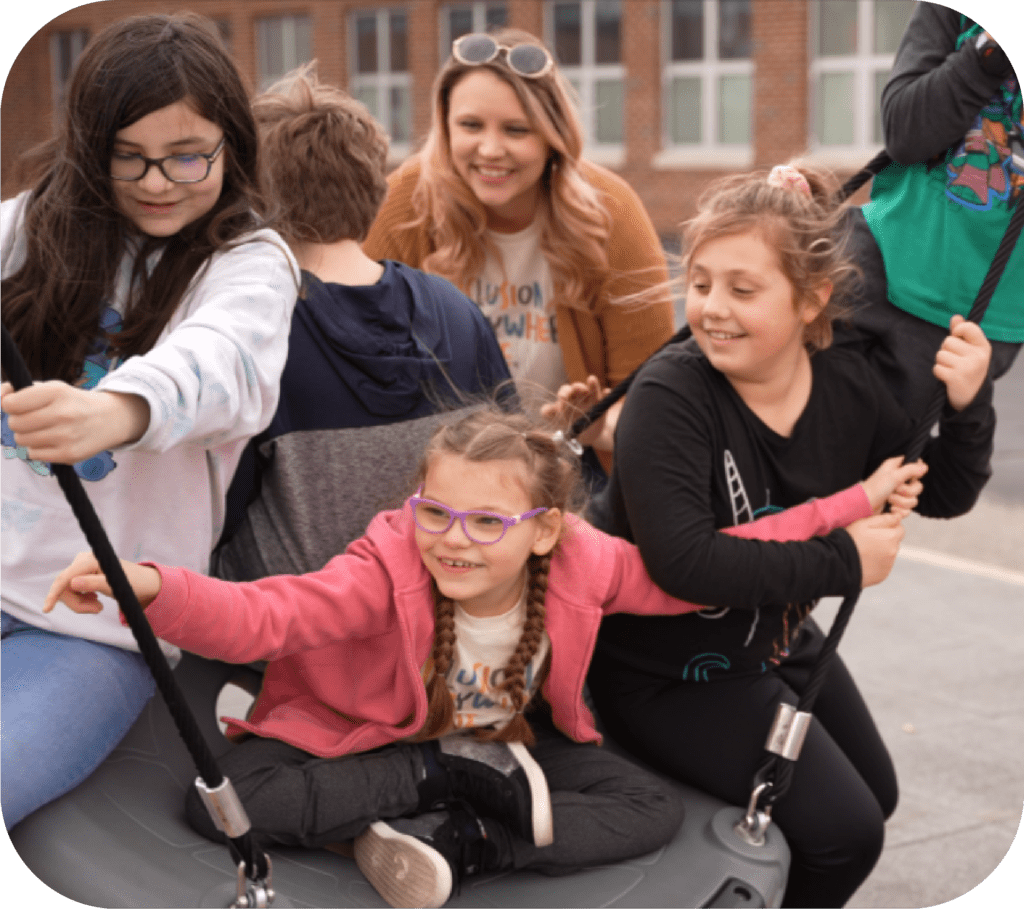July 14, 2022
Holly Carmichael
It’s been 32 years since the Americans with Disabilities Act (ADA) passed. In that time, we’ve seen fantastic improvements in accessibility in daily life, transportation, workplaces, and so much more. This includes huge steps toward prohibiting discrimination.
But in the hustle, we left fun, laughter, and inclusion for kids on the playground far behind.
The Battle for Inclusive Playgrounds Is On-Going
If you’ve ever looked at a playground and thought, “Wow, kids with mobility devices could easily use that slide,” then you’re a rare lucky one with access to an inclusive playground. Most public playgrounds, whether at a park or a school, generally were not built with full accessibility or inclusivity in mind.
For kids living with disabilities, traditional playgrounds exclude them and their families from play that is critical to development and socialization. It cuts them off from an important aspect of community life—or causes them to risk their safety in order to participate.
Bringing the Battle for Inclusion Close to Home
This is an incredibly important issue to me and my family. Four years ago, not a single ADA-compliant playground was available in my home county—St. Joseph County, Michigan.
At the time, my daughter Maggie would be lifted from her wheelchair and spend her school recess sitting in wood chips, coming home with painful splinters. It took me six months to gain approval to present my idea for an inclusive playground to the school board, and many, many more months to put funding for the project to the voters.
Three years of time, energy, and advocacy finally resulted in an ADA-compliant and inclusive playground that all kids and their families can enjoy. I’m grateful for this chance to make change. But I’m disappointed that it took three years for one playground. And I’m deeply saddened by the fact that—more than 30 years after the ADA passed—playground inclusion for all kids and their families is still an afterthought.
The Difference Between ADA-Compliant and Inclusive
Let’s quickly talk about the difference between ADA-compliant and inclusive. Many public playgrounds make token efforts to appear accessible. Take wood chips for example.
Mulch/wood chips technically meet the regulations of ADA only if they are raked, tamped, and filled every single day. Obviously, this doesn’t happen. Meaning that playgrounds remain inaccessible and dangerous to kids and their families with and without disabilities.
This is the result of following the letter of accessibility but not the spirit of inclusion. The spirit of inclusion looks for ways to make playgrounds fun for everyone, while the letter of accessibility just looks to check a box on some form.
This can make situations even more dangerous for kids with disabilities and their families, leading to more accidents and injuries due to “compliant” terrain that isn’t maintained. And in the end, the result is the same: kids are left on the sidelines.
Inclusive Playgrounds Are Healthy for Kids and Families
The goal of inclusive playgrounds is fun for all. Where all kids of all abilities and their communities can come together to make connections and enjoy shared experiences. It promotes visibility, acceptance, and understanding of those who experience different challenges in their day-to-day lives.
Considerable thought and planning need to happen to create these unique spaces, and every effort should be made to incorporate several key elements:
- Physical, sensory, and social activities that encourage creative, cooperative play and social interaction
- Multiple levels of challenge all in one feature or grouped together, so kids of different ability levels can all play together
- Elevated decks and paths that kids will be excited about
- Pods, rooms, and zones that allow kids who might be feeling overstimulated to experience a quiet moment
- Flat, stable, unitary surfacing rather than wood chips or mulch to create a safe surface for multiple mobilities
- Wide routes and maneuverability for mobility devices and space to run that always lead kids to fun destinations

It’s up to us—as communities—to require inclusion as a necessity for our playgrounds. Doing this means educating ourselves and promoting the spirit of inclusion everywhere, from weekend get-togethers to city council meetings.
And promoting inclusive play is why GT Independence is once again hosting Fair Play for All.
Fair Play for All: Celebrate Play! Brings the Fun Right to Your Feed
In celebration of the ADA and in recognition of the work that remains, Fair Play for All: Celebrate Play! is a campaign that calls our communities to create inclusive playgrounds for all kids.
Throughout July 2022, check out our Facebook page and join us as we explore an inclusive playground and talk about features that make it fun for all kids and their families. We’ll be posting about the issue throughout the month.
Talk the Talk, Walk the Walk
We’ve been talking a lot about inclusive playgrounds, so it’s only right that we experience one. That’s why—to celebrate Fair Play for All—we’re offering a chance to win a trip to Morgan’s Wonderland, a nonprofit and fully inclusive theme park in San Antonio, Texas.
We’ll be celebrating my daughter Maggie’s 9th birthday there in September. And we’ll be inviting all the “Fair Play for All” contest winners to join us! You can also learn more about the contest here.
Advocacy Has No Expiration Date
Although Fair Play for All only lasts a few weeks, advocating for better inclusion is a lifelong mission that’s dear to my heart.
Here in my hometown of Sturgis, we’re expanding on the accessible playground with a splash pad that all kids and their families can use. And I can’t wait to see what we create next!
How about you? What inclusive fun will you and your community create?
